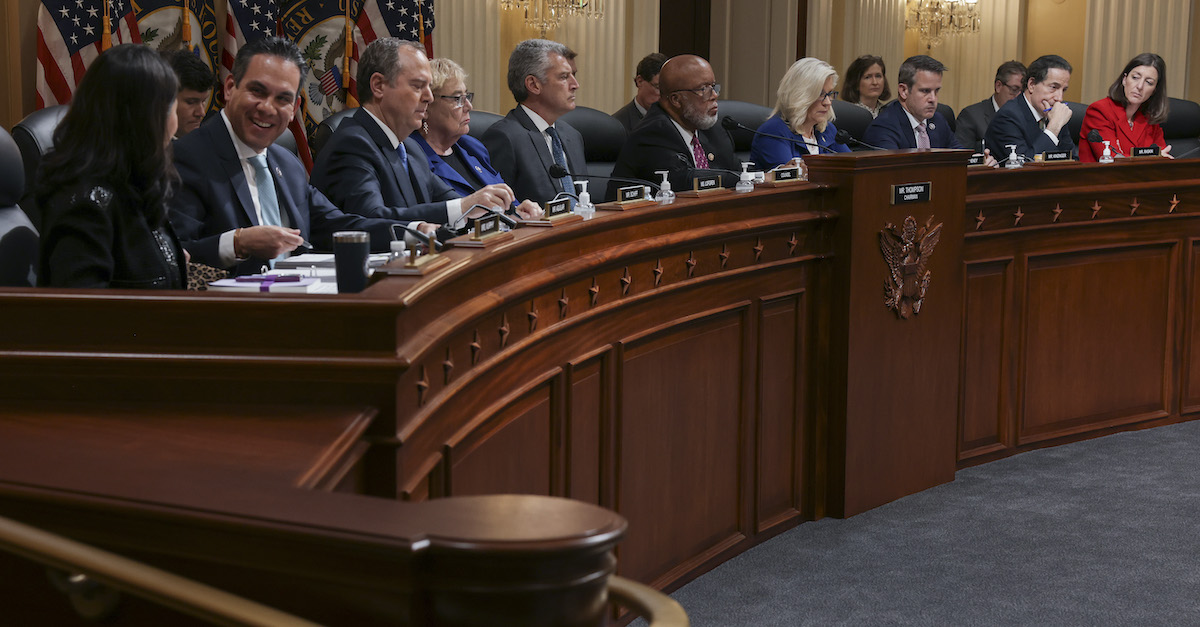
The House Select Committee to Investigate the January 6th Attack on the U.S. Capitol votes to subpoena former President Donald Trump, in the Cannon House Office Building on Oct. 13, 2022 in Washington, D.C. (Photo by Alex Wong/Getty Images)
The Jan. 6th Committee capped off what may be its final public proceedings before the release of its long-anticipated report with an historic curtain-dropper: a unanimous vote to subpoena Donald Trump.
Though a shot across the bow to the former president, the subpoena may ultimately prove more symbolic than a legal gauntlet thrown, experts tell Law&Crime.
Republicans are fighting for control of Congress in the upcoming midterm elections, and the the subpoena will elapse as this Congress’s session wraps up by years end. Any GOP-controlled House would almost certainly disband the Committee, and even if the Democratic party maintains control, the panel would likely release their report before Election Day.
Given the time crunch, three former federal prosecutors noted, Trump can run out the clock either through his actions or his inaction.
“It looks to me like the subpoena is more about trying to let them say that they tried to complete the record and give [Trump] an opportunity to speak on the record,” CNN legal analyst Jennifer Rodgers, a longtime ex-prosecutor with the Southern District of New York, told Law&Crime in an interview. “So, you know, I don’t think he’ll even try to question it, I think he’ll ignore it. And then they won’t go to court to try to enforce it.”
“Nor will they try to seek a criminal referral to DOJ,” she continued. “They would have to do this step of going to court first. So I think it was largely symbolic, so that they could say, ‘We tried to get testimony from everyone. We gave him the opportunity to speak to us and tell us his side of things.'”
Mitchell Epner, a former federal prosecutor from the District of New Jersey who’s now a partner at Rottenberg Lipman Rich PC, also doesn’t expect to see Trump answer questions to the committee under oath. But he does not regard the vote to subpoena Trump as an empty gesture.
“I do not expect to see FPOTUS testify in front of the 1/6 Committee,” Epner told Law&Crime in a text message. “It is, however, a very powerful way to close their work.”
“From the start, I have believed that one purpose of the 1/6 Committee was to shift the Overton Window regarding criminal prosecution of FPOTUS,” he continued. “In that, I believe they have succeeded.”
Earlier in the proceedings on Thursday, Rep. Liz Cheney (R-Wyo.) disclosed that the Committee is considering a “series of criminal referrals” to the Justice Department. A federal judge, in a civil matter earlier this year, said Trump “more likely than not” committed two felonies: obstruction of an official proceedings and conspiracy to defraud the United States. A criminal case would have a much higher burden of proof, and any referral by the committee would not have legal weight binding upon the Justice Department.
Despite agreeing that Trump could potentially blow off the subpoena on the assumption that the committee wouldn’t take action to enforce it, Epner found it more probable that he would fight it in court.
“The danger of simply ignoring it is ‘inherent contempt,'” Epner said, referring the Congress’s own enforcement power.
Former federal prosecutor Renato Mariotti likewise believed legal action would be imminent.
“I expect Trump to file frivolous legal challenges to run out the clock until the new Congress takes over,” Mariotti told Law&Crime.
Though none of the experts predict Trump would take the hot seat, all thought he would avail himself of his right to remain silent in that hypothetical scenario.
“If anyone has a legitimate exercise of the Fifth Amendment, it’s him, right?” quipped Rodgers.
Trump asserted his Fifth Amendment right some 440 times during his deposition in a civil fraud investigation by New York Attorney General Letitia James (D), who later filed a massive lawsuit seeking to bar the former president and three of his adult children from serving as officers on any Empire State corporations.